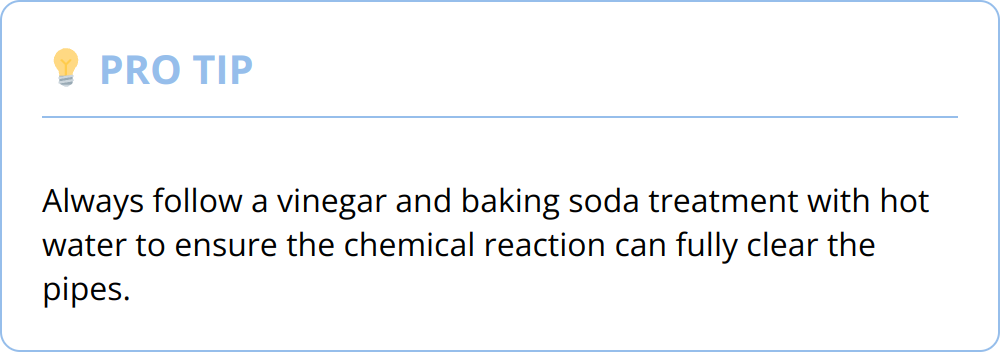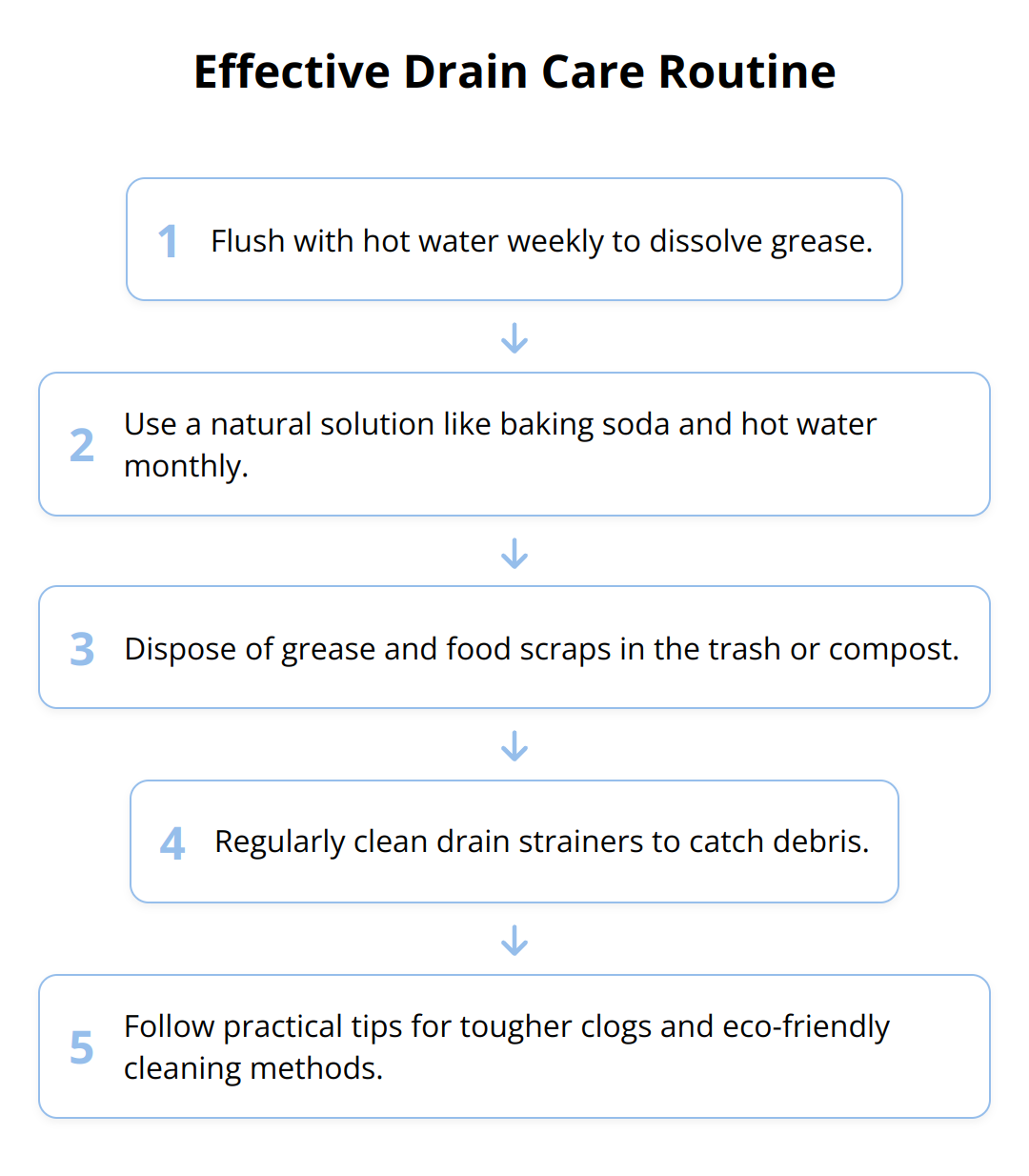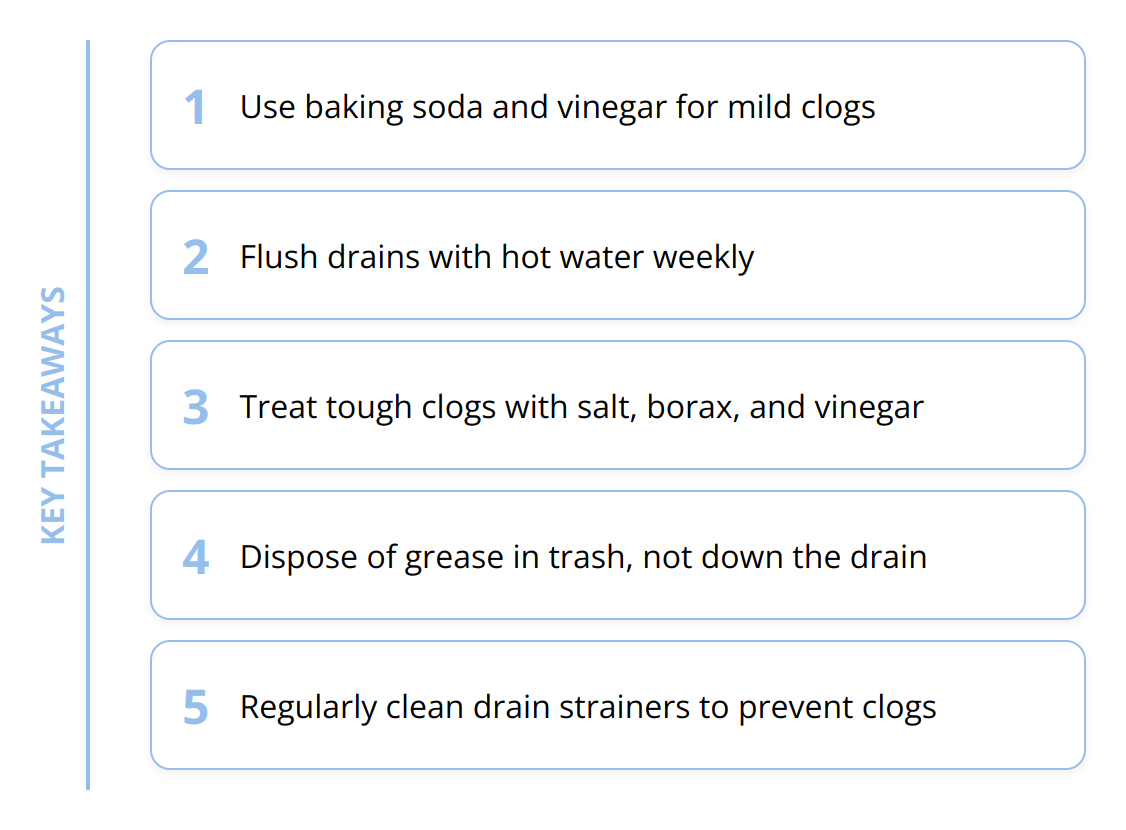Clogged drains are a common household problem that can often lead to frustration and unnecessary expense. At The A Team Cleaning Services, we believe in tackling this issue with safer, more sustainable methods.
Turning to harsh chemical cleaners should be a last resort, not only for the health of your plumbing system but for the well-being of our environment. This guide will show you effective, natural alternatives to keep your drains flowing smoothly.
The Risks of Chemical Cleaners
Opting for chemical drain cleaners can seem like an easy fix, but the risks they pose to health, plumbing integrity, and the environment make them undesirable. Understanding these risks can help us choose better, more sustainable cleaning methods.
Health and Safety Hazards
Chemical drain cleaners are notorious for their toxic ingredients, which can cause serious health issues with improper use. Inhalation of fumes can lead to respiratory problems, while skin or eye contact can cause burns or irritation. The volatility of these chemicals also brings a risk of accidents, particularly in homes with children or pets. It’s essential to prioritize safety and consider natural alternatives.
Potential Plumbing Damage
Despite their popularity, these cleaners can be surprisingly harmful to your plumbing. The very chemicals designed to dissolve clogs can also eat away at your pipes over time, especially if they are older or made of PVC. Frequent use of caustic cleaners can lead to weakened plumbing, leaks, and costly repairs down the line. For maintaining your plumbing’s longevity, gentler, natural methods are recommended.

Environmental Impact
The environmental footprint of chemical drain cleaners is significant. These products are packed with harmful substances that can end up in waterways, affecting aquatic life and polluting ecosystems. Moreover, the production and disposal of these cleaners contribute to environmental degradation. By choosing eco-friendly cleaning methods, we play a part in protecting our planet.

For those looking for sustainable cleaning alternatives, exploring natural solutions such as baking soda and vinegar or eco-friendly gadgets can offer effective and safe ways to maintain clear drains without the adverse effects associated with chemical products. Shifting our cleaning practices toward more natural methods not only benefits our immediate environment but also contributes to a healthier planet.
Home Remedies for Clear Drains
Switching to natural methods for cleaning clogged drains not only protects our health and plumbing but also supports environmental sustainability. Let’s explore some effective home remedies that are both safe and easy to use.
Baking Soda and Vinegar: A Powerful Combo
This duo is more than just a science fair volcano. When combined, baking soda and vinegar can effectively break down clogs in your drains. Pour half a cup of baking soda followed by one cup of vinegar down the drain. Cover it to direct the reaction downward and wait for 30 minutes. The fizzing action helps to dislodge grime and build-up. After waiting, flush the drain with boiling water to clear out the debris. This method works great for routine maintenance and mild blockages.
The Hot Water Flush: Simple Yet Effective
Sometimes, the simplest methods are the most effective. Boiling water can be a quick fix for greasy clogs. Grease solidifies in your pipes causing slow drainage. Boiling water melts the grease, restoring flow to your drains. Do this weekly to keep grease build-ups at bay. However, use caution with PVC pipes, as overly hot water can loosen joints.

Salt, Borax, and Vinegar: For Tougher Clogs
For drains that need a stronger treatment, a mixture of salt, borax, and vinegar can do the trick. Mix ¼ cup of salt and ¼ cup of borax, then pour it down the clogged drain. Follow this with half a cup of vinegar to create a chemical reaction that cuts through tougher clogs. After letting it sit for an hour, flush the drain with hot water to clean out any residual debris. This mixture not only clears out blockages but also leaves your drains smelling fresh.
Remember, while these methods are effective for many common clogs, some situations may require professional attention. If a clog persists after trying these home remedies, it might be time to call in experts to prevent damage to your plumbing system.
By incorporating these natural methods into your cleaning routine, you can keep your drains flowing smoothly without relying on harsh chemicals. Embracing eco-friendly solutions not only benefits our homes but also the planet.
For more on keeping a sustainable and well-maintained home, visit our sustainable living guide.
Keeping Drains Clear
To maintain smooth-flowing drains and avoid the pitfalls of clogs, adopting preventative measures is essential. A proactive approach to drain care can save time, money, and the environment by reducing the need for intensive cleaning and harsh chemicals.
Regular cleaning is not just advisable; it’s a necessity for healthy drains. A straightforward routine involves flushing your drains with hot water weekly to melt away any beginning buildups, particularly of grease. Incorporating a monthly cleaning with a natural solution, such as baking soda and hot water, can further prevent clogs. For kitchens, especially, avoiding clogs starts with mindful disposal habits. Grease and food scraps are the primary culprits behind kitchen sink clogs. Instead of pouring grease down the drain, cool it and dispose of it in the trash. Food scraps, even small ones, should go to compost or garbage rather than down the sink. Even with a garbage disposal, the less solid waste that enters your plumbing, the better.
Drain strainers are unsung heroes in the fight against clogged drains. These simple, inexpensive meshes can catch hair in showers and bits of food in kitchens, preventing them from entering your plumbing system. Cleaning the strainers regularly is a small task with big benefits, effectively keeping unwanted materials out of your pipes.

Actionable tips for prevention:
- Flush with hot water weekly
- Monthly baking soda and hot water treatment
- Dispose of grease and food scraps properly
- Use and regularly clean drain strainers
By following these practices, you can significantly reduce the risk of clogs and maintain a healthier, more eco-friendly home. For tougher clogs or advice on natural cleaning methods, consider reading more on quick garbage sorting tips. Proactive maintenance, coupled with the right habits and tools, makes all the difference in keeping your drains clear and functional.
Final Thoughts
Choosing natural methods for drain cleaning not only safeguards our health and plumbing systems but significantly benefits the environment. This guide has highlighted several easy-to-use, effective home solutions that keep our drains clear and contribute to a healthier planet. Embracing such sustainable practices aligns with our shared responsibility towards environmental conservation.

Regular maintenance is key to preventing clogs and ensuring the longevity of our plumbing. Simple habits like flushing drains with hot water weekly and using natural cleaners monthly can make a substantial difference. By incorporating these practices, we minimize the need for emergency interventions and maintain our plumbing in top condition with minimal effort.
We at The A Team Cleaning Services strongly advocate for environmental responsibility. We understand the importance of maintaining not only a clean home but also contributing to a cleaner world. Our professional cleaning services use eco-friendly products and methods to ensure your space is not just clean but also safe and sustainable. We tailor our cleaning plans to meet specific needs, ensuring quality and customer satisfaction.
Taking these steps towards natural cleaning methods and regular maintenance contributes to a healthier living environment and reduces our ecological footprint. Let’s make a positive impact together by choosing safer, more sustainable ways to maintain our homes.
For a pristine living environment without the hassle, consider our professional house cleaning service. Together, we can keep our homes and the planet cleaner and safer for generations to come.
